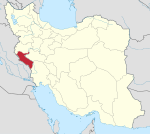Irajabad, Ilam
Appearance
Irajabad
Persian: ايرج اباد | |
|---|---|
Neighborhood | |
| Country | Iran |
| Province | Ilam |
| County | Darreh Shahr |
| District | Mazhin |
| City | Mazhin |
| Population (2011)[1] | |
• Total | 93 |
| Time zone | UTC+3:30 (IRST) |
Irajabad (Persian: ايرج اباد)[a] is a neighborhood in the city of Mazhin in Mazhin District of Darreh Shahr County, Ilam province, Iran.
Demographics
[edit]Ethnicity
[edit]The neighborhood is populated by Lurs.[3]
Population
[edit]At the time of the 2006 National Census, Irajabad's population was 185 in 41 households, when it was a village in Mazhin Rural District.[4] The following census in 2011 counted 93 people in 23 households.[1]
After the census, the village of Mirza Hoseynabad merged with the villages of Fathabad, Hamgam, Heyderabad, and Irajabad to form the new city of Mazhin.[5]
See also
[edit]Notes
[edit]References
[edit]- ^ a b Census of the Islamic Republic of Iran, 1390 (2011): Ilam Province. irandataportal.syr.edu (Report) (in Persian). The Statistical Center of Iran. Archived from the original (Excel) on 17 January 2023. Retrieved 19 December 2022 – via Iran Data Portal, Syracuse University.
- ^ Irajabad can be found at GEOnet Names Server, at this link, by opening the Advanced Search box, entering "-3765144" in the "Unique Feature Id" form, and clicking on "Search Database".
- ^ "Language distribution: Ilam Province". Iran Atlas. Retrieved 24 March 2021.
- ^ Census of the Islamic Republic of Iran, 1385 (2006): Ilam Province. amar.org.ir (Report) (in Persian). The Statistical Center of Iran. Archived from the original (Excel) on 20 September 2011. Retrieved 25 September 2022.
- ^ Rahimi, Mohammad Reza (4 January 2013) [Approved 8 January 1390]. Approval letter regarding the transformation of Mazhin village from the functions of Mazhin District of Darreh Shahr County to a city. rc.majlis.ir (Report) (in Persian). Ministry of the Interior, Political and Defense Commission. Proposal 4/1/19877; Letter 158802/T38854H; Notification 55920/T46709K. Archived from the original on 20 June 2012. Retrieved 8 February 2024 – via Islamic Parliament Research Center.

